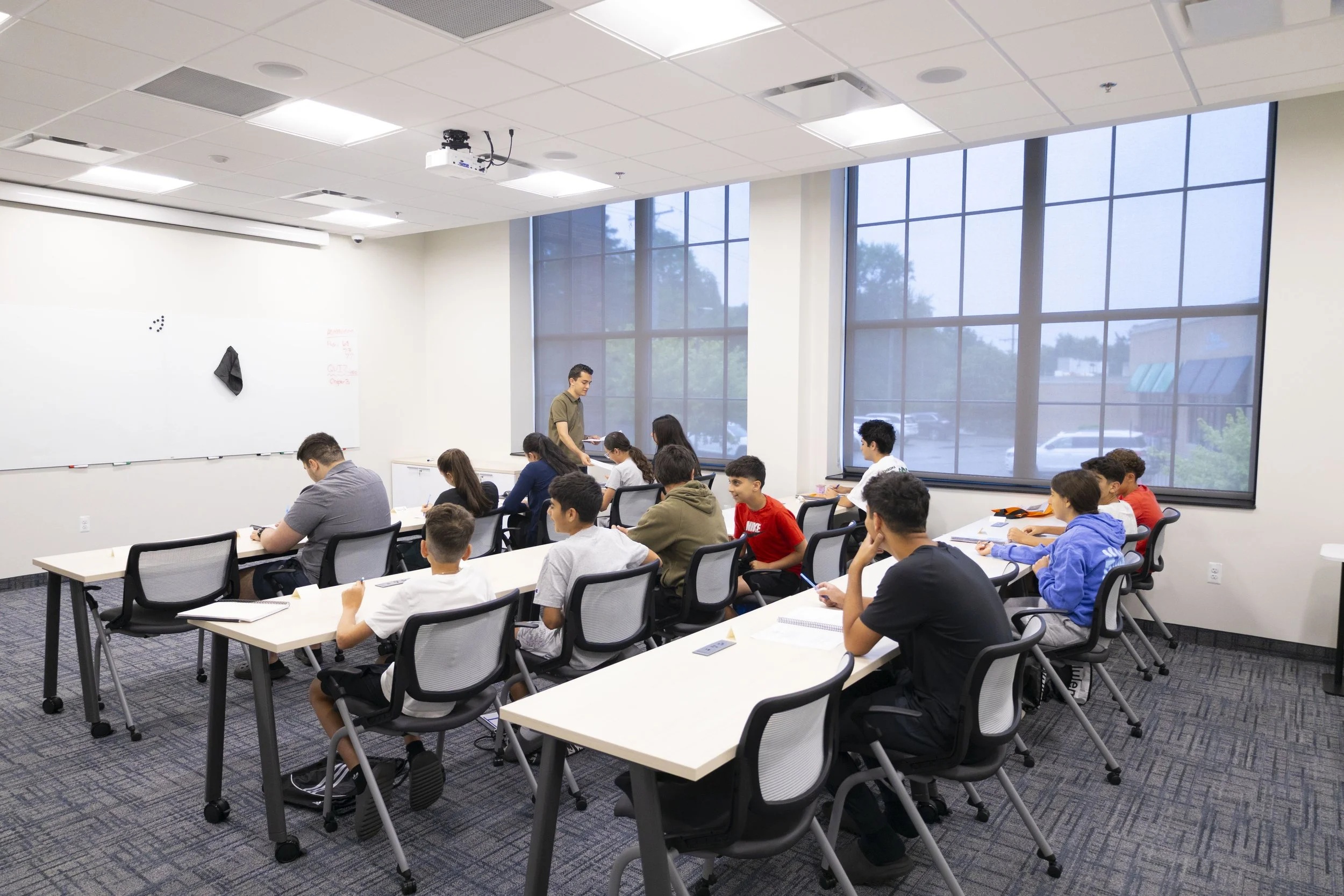Saving Sureth
Chaldean language classes are offered at CCF West. This class is composed of students aged 13-19.
Chaldean teens connect with their roots through language classes
By Sarah Kittle
“Chaldean Community Foundation East is about acculturation; CCF West is about cultural preservation.”
So says Martin Manna, president of both the Chaldean Community Foundation and the Chaldean American Chamber of Commerce. The two organizations now share a permanent home at the new community center on Walnut Lake Road in West Bloomfield.
One of the primary goals of this new space is to help preserve Chaldean culture. While many Chaldeans in metro Detroit are generations removed from Iraq, the pride in their heritage remains strong.
And at the heart of that culture is language.
Language is more than just communication—it’s how a culture expresses, transmits and protects its values, beliefs and traditions. Idioms, proverbs and figures of speech often reveal a culture’s worldview.
“Our language ties us to who we are,” says Michael Antoon, who co-teaches the current Chaldean language class for 13- to 19-year-olds alongside Patrick Kakos. “By preserving the Chaldean language in our youth, we are rebuilding the foundation our ancestors worked so hard to maintain—for our children to know who they are, where they came from and who they are meant to be.”
That’s heavy stuff for teens.
Farah Shammami, who oversees programming for CCF West, says Chaldean—also known as Sureth—language classes are just the beginning of what’s to come.
“I’ve known Michael Antoon and Patrick Kakos for years,” Shammami says. “They’re both deeply involved in the church and fluent in reading, writing and speaking Sureth. I knew they were teaching a language class at St. Thomas Chaldean Catholic Church and thought they’d be perfect to launch our inaugural Chaldean class at CCF West.”
One early concern was whether teenagers would consistently attend a summer course. That worry quickly vanished.
“I’ve been very surprised—and impressed—that this hasn’t been a problem,” Antoon says. “Even on beautiful summer days, our students show up on time and ready to learn.”
The language classes are a partnership between the Mar Ibrahim Library and the Chaldean Community Foundation. “The curriculum is published by the Chaldean Diocese of St. Thomas the Apostle,” explains Kakos. “It was originally created by Shamasha Khairy Foumia.”
The two-level textbook series, Let’s Learn How to Speak Chaldean, is geared toward children but can be used by learners of all ages. It includes classroom and at-home exercises. “The books provide the most essential vocabulary,” says Kakos.
Primarily a conversational course, the program is designed to encourage dialogue between generations.
“It’s especially inspiring to hear that students go home and speak with their parents and grandparents in Chaldean,” Antoon says. “We’ve even had students come up to us at church to greet us and hold simple conversations using what they’ve learned—asking how we are, saying goodbye.”
The class has proven to be a perfect way to engage youth during the summer.
“The students are consistently attending classes, engaged and genuinely want to learn,” Shammami says. “They come in on Monday mornings excited to share that they spoke a few sentences with their grandparents or that they understood something new.”
While Kakos grew up speaking Chaldean, Antoon did not know much beyond basic greetings. With a passion to learn, he practiced with deacons, priests and especially Kakos. Over time, his fluency improved to the point where he now uses his own journey to inspire students.
“It goes to show,” Antoon says, “no matter where you start, with dedication, you can achieve what you set your mind to.”
Each chapter in the textbook includes four to five lessons. After each one, students take a 20-point quiz to reinforce their vocabulary and grammar.
“The quizzes ensure students spend time outside of class reviewing and doing homework,” Antoon explains. They help them grasp important aspects like gendered language forms, which differ in every language.
Sureth includes guttural sounds and tricky consonants, so each class session includes group pronunciation practice.
After advancing to the Level 2 textbook, students took a midterm exam that reviewed all of Level 1. It included a 25-point written portion and a 15-point oral assessment.
“No notes, no materials,” Antoon says. “Just students using what they’ve learned in real conversations.”
Student motivation comes from a variety of places.
“For me, the reason I took the class is because our language comes from the language Jesus spoke,” says student Thomas Yasso.
Paul Alkamano, another student, adds, “I can speak with my family, and if they’re not strong English speakers, we can speak Chaldean.”
That desire to bridge generational divides is a recurring theme.
“My grandma only speaks Chaldean,” says student Genevieve Shina. “It’s the only language she knows. She’ll talk to you in Chaldean, and if you don’t respond, you don’t respond. I want to be able to have a real conversation with her.”
More lessons are in the works for the two fully equipped classrooms at CCF West—including a Sureth class for adults.
“We’re looking forward to adding more lessons in both Sureth and Arabic to our programming calendar,” says Shammami.
“It’s a precious jewel in our community,” says Antoon, referring to the Chaldean language. “Just like you pass down recipes and history, we need to pass down our language—to preserve it for years to come.”
Michael Antoon and Patrick Kakos are lecturers and will be ordained sub-deacons on August 10 at 12pm at St. Thomas by Bishop Francis.

